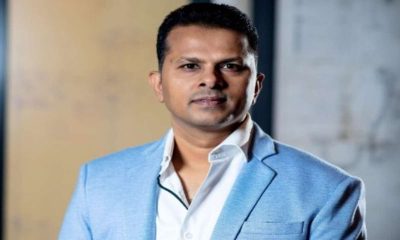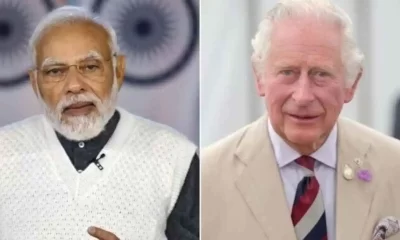Latest Science News
Israel cancer cure claim debunked by experts
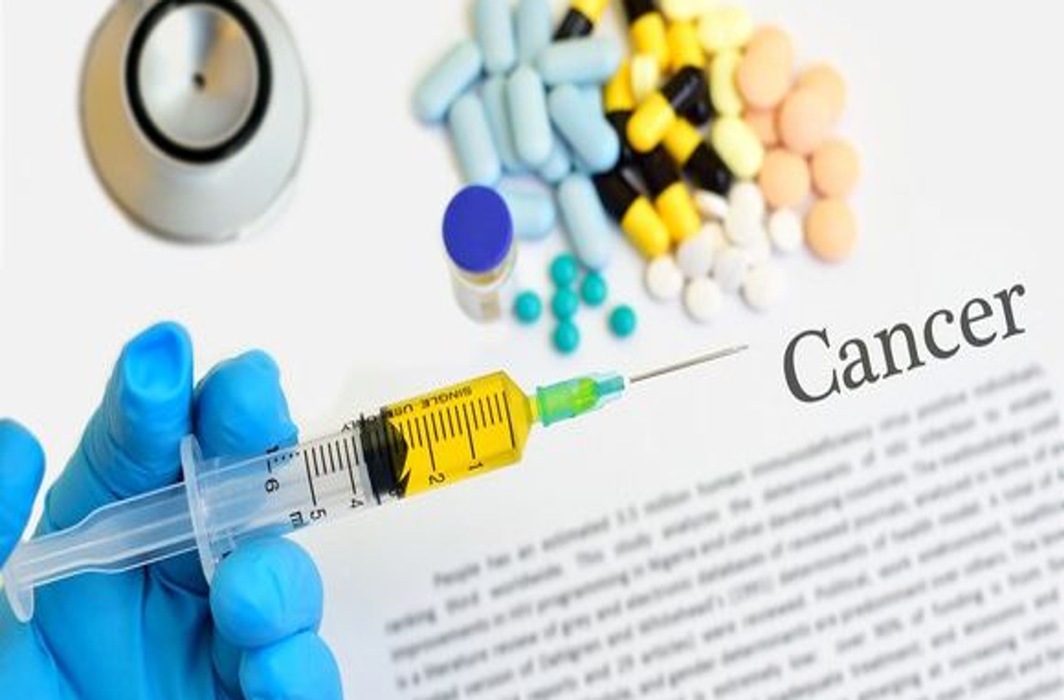
[vc_row][vc_column][vc_column_text]The Israeli biotech company, Accelerated Evolution Biotechnologies (AEBi), has announced a medical breakthrough that will cure cancer.
The company claimed that they will have the cure for this deadly disease by 2020.
Dan Aridor, of the firm Accelerated Evolution Biotechnologies Ltd. (AEBi) behind the claims, told The Jerusalem Post: “We believe we will offer in a year’s time a complete cure for cancer.”
“Our cancer cure will be effective from day one, will last a duration of a few weeks and will have no or minimal side-effects at a much lower cost than most other treatments on the market,” he said. “Our solution will be both generic and personal.”
The treatment called MuTaTo (a portmanteau of multi-target toxin), is based around small fragments of proteins called peptides, designed to target cancer cells.
Dr. Ilan Morad, CEO of AEBi, which is based at the Weizmann Science Park, Israel, explained to The Jerusalem Post that some existing cancer treatments hone in on targets “on or in the cancer cell.” But if the cell mutates, the treatment can become ineffective.
According to Morad, MuTaTo features a trio of peptides and a toxin that launch a three-pronged attack on cancer receptor proteins. The treatment could also have the potential to obliterate slow-growing cancer stem cells, which drugs designed to kill faster cells, can fail to, he said.
“We believe we will offer in a year’s time a complete cure for cancer,” said Aridor.
Morad said the firm had carried out in-vitro and mice experiments, and is set to launch clinical trials.
It was not clear if their results had been published in a peer-reviewed medical journal.
The news of such a big discovery spread online, other cancer experts urged the public to approach the report with caution.
Many experts who are doing research on this topic for a long period of time shared their views.
Dr. Darren Saunders, a cancer biologist at the University of New South Wales, Australia, tweeted the researchers were “selling unicorns.”
Please stop boosting the Israeli biotech claiming a cancer cure within a year. I can find very little published data, and the in vitro data on their website is underwhelming at best.
They’re selling unicorns.— Dr Darren Saunders (@whereisdaz) January 29, 2019
Professor Lawrence Young, director of the Warwick Cancer Research Centre at the University of Warwick, U.K., told Newsweek he was concerned the team had not appeared to publish their data in a peer-reviewed journal, and that no clinical trials had been performed. Such trials are the first step outside of the laboratory in drug development.
As per report by Newsweek, Julia Frater, senior cancer information nurse at the charity Cancer Research UK, “Unsubstantiated claims that there will be a cure for all cancers in a year are irresponsible and can be misleading for patients. This oversimplifies the fact that cancer is more than 200 different diseases, which behave differently and pose different treatment challenges. This is why finding a single cure for all cancers is unlikely.”
Professor Chris Bunce, who specializes in translational cancer biology at the University of Birmingham, U.K., told Newsweek that widely used treatments such as chemotherapy were previously regarded as “radical” and said the “technology being talked about here may be another step in that journey.”
Bunce explained why creating cancer drugs is so difficult. “On one hand cancer cells are not the big scary monsters that the general public believes them to be. More than 99.9 percent of the molecular processes within them are the same as the normal cells they originate from. So finding drugs that only target cancer cells is like finding needles in haystacks.
(Inputs from media sources)[/vc_column_text][/vc_column][/vc_row]
India News
President Droupadi Murmu launches India’s first homegrown CAR T-cell therapy for cancer treatment
The gene-based therapy, which is developed by the IIT Bombay and Tata Memorial Centre, is being rolled out in India at about one-tenth of its price outside the country.
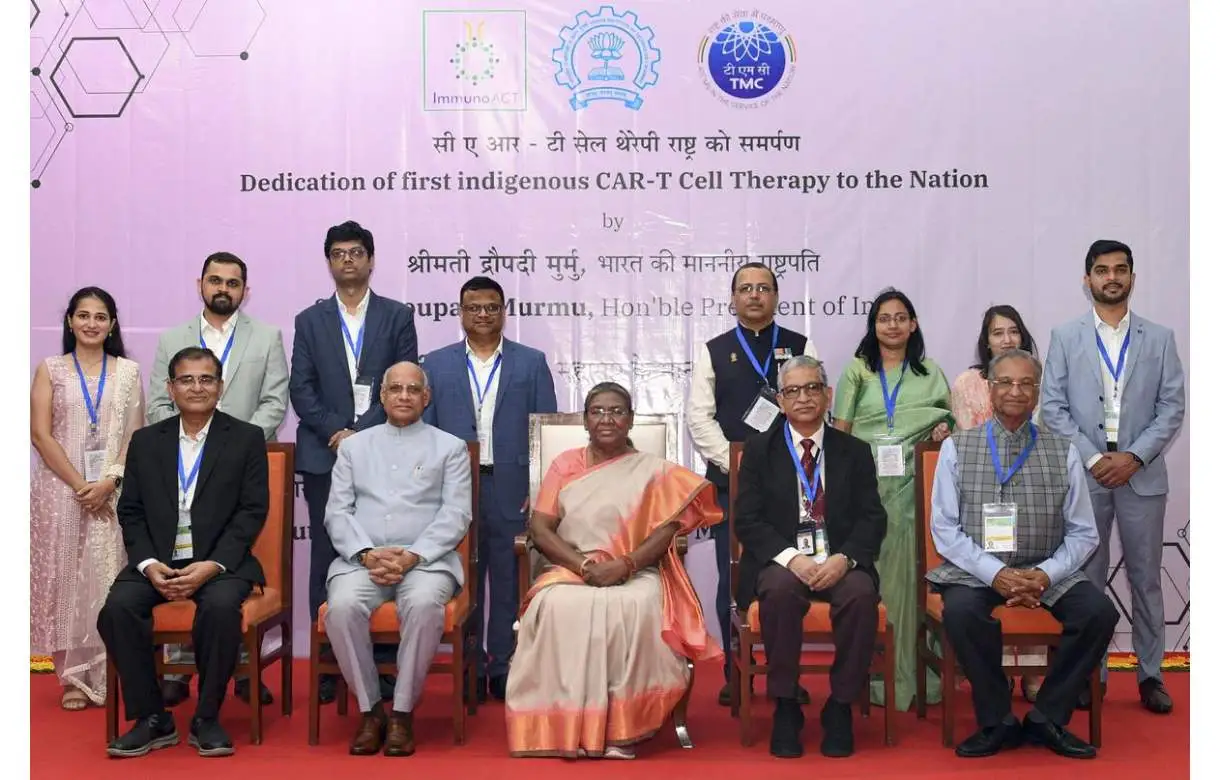
President Droupadi Murmu on Thursday launched India’s first indigenously-developed CAR T-cell therapy, a gene-based therapy, for cancer treatment, hailing it as a breakthrough that provides new hope for humankind in the battle against the diseases.
Speaking at the launch event at the Indian Institute of Technology (IIT) Bombay, Murmu said the indigenous development of the CAR T-cell therapy was an example of the Make in India initiative.
The gene-based therapy, which is developed by the IIT Bombay and Tata Memorial Centre, is being rolled out in India at about one-tenth of its price outside the country, as per the senior official.
In CAR T-cell therapy, a patient’s T-cells, which is a type of immune system cell or stem cell, are modified in the laboratory and inserted back into the patient to attack and destroy cancer cells after editing the stem cell.
The NexCAR19 CAR T-cell therapy, the country’s first Made in India CAR T-cell therapy, is expected to bring down the cost of treatment significantly.
During her speech, Murmu said that this therapy is considered a phenomenal advance in medical sciences. The development of this therapy is also an example of the Make in India initiative and speaks volumes about Indian scientists and physicians, she added.
The launch of India’s first gene therapy is a significant breakthrough in the battle against cancer. As this line of treatment, named CAR T-cell therapy, is accessible and affordable, it provides a new hope for the whole of humankind, President Murmu further added.
The Tata Memorial Centre director Sudeep Gupta said the CAR T-cell therapy was enormously expensive and out of the reach of an overwhelming majority of people.
Asserting that, he said NexCar19 needs to be custom manufactured for every patient under the most stringent conditions, but it has been rolled out at approximately one-tenth of the price at which it is available outside India.
The treatment costs approximately Rs 4 crore abroad against Rs 30 lakh in India, said IIT Bombay director Prof Subhasis Chaudhuri.
He further said that the low-cost CAR T-cell therapy was a huge achievement for the country and cancer patients, and places India firmly on the global map of cell and gene therapy.
Comparing the achievement of Chandrayaan-3 with CAR T-cell therapy, Chaudhuri asserted that CAR-T cell therapy heralds India’s entry into the cell and genetic engineering group.
The Tata Memorial Centre director Gupta said the treatment will help some 20,000 Indians every year, and its rollout is a milestone in the field of cancer care and genetic engineering.
He added the CAR T-cell was not only a scientific achievement of the highest order but also had immense practical application. NexCAR19 will save many, many lives and wipe many, many tears, he emphasised.
India News
ISRO launches weather satellite INSAT-3DS to monitor Earth’s surface, oceans
The Naughty Boy has now become a mature, obedient and disciplined boy like PSLV, and GSLV as they have become a very robust vehicle for ISRO, said Tomy Joseph.
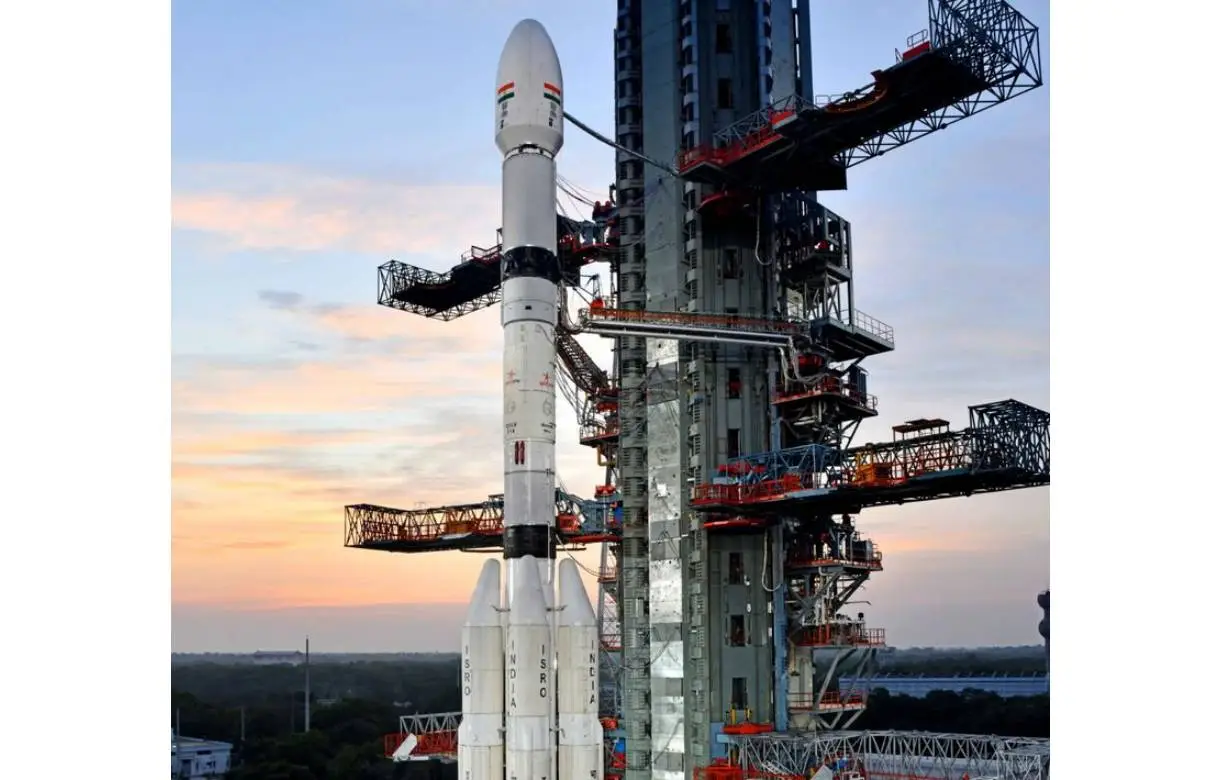
The Indian Space Research Organisation (ISRO) on Saturday launched the INSAT-3DS mission from Satish Dhawan Space Centre in Sriharikota at 5:35 pm to monitor the Earth’s surface, observe the ocean and analyse the environment through various essential meteorological perspectives.
In its mission, the Geosynchronous Satellite Launch Vehicle (GSLV) aimed to deploy the INSAT-3DS meteorological satellite into the Geosynchronous Transfer Orbit (GTO). Subsequent orbit-raising maneuvers will ensure that the satellite is positioned in a Geo-stationary Orbit.
After being positioned in GSO, it will provide information on diverse atmospheric conditions via vertical profiles. INSAT-3DS will manage data collection and dissemination from Data Collection Platforms (DCPs). The satellite will help in search and rescue services.
Congratulating the team, ISRO Chairman S Somanath expressed his happiness over the successful accomplishment of the mission GSLV-F14 INSAT-3DS. He further said that the spacecraft has been injected into a very good orbit. The space agency has also noted that the vehicle has performed very well.
The INSAT-3DS Mission Director, Tomy Joseph sarcastically remarked, saying the Naughty Boy has now become a mature, obedient and disciplined boy like PSLV, and GSLV as they have become a very robust vehicle for ISRO.
The Geosynchronous Satellite Launch Vehicle (GSLV) is a launch vehicle with a length of 51.7 meters and a liftoff mass of 420 tonnes. It consists of three stages, the first stage (GS1) is made up of a solid propellant motor with 139-ton propellant and four earth-storable propellant stages (L40) strapons. Each strapon carries 40 tons of liquid propellant.
The second stage (GS2) is also an earth-storable propellant stage that carries 40-ton propellant, and the third stage (GS3) is a cryogenic stage with a 15-ton propellant loading of liquid oxygen (LOX) and liquid hydrogen (LH2).
To protect the satellite during the atmospheric regime, it is covered by an Ogive payload fairing. The GSLV is versatile and can be used to launch various spacecraft capable of performing communications, navigation, earth resource surveys, and other proprietary missions.
The launch of INSAT-3DS was a follow-on mission of Third Generation Meteorological Satellite from Geostationary Orbit. According to ISRO, the GSLV-F14/INSAT-3DS mission has been fully funded by the Ministry of Earth Sciences (MoES) and designed for enhanced meteorological observations and monitoring of land and ocean surfaces for weather forecasting and disaster warning.
The satellite will augment the Meteorological services along with the presently operational INSAT-3D and INSAT-3DR satellites.
Notably, the services will be used by various departments of the MoES such as the India Meteorology Department (IMD), National Centre for Medium-Range Weather Forecasting (NCMRWF), Indian Institute of Tropical Meteorology (IITM), National Institute of Ocean Technology (NIOT), Indian National Center for Ocean Information Services (INCOIS) and various other agencies.
India News
PM Modi says day not far when an Indian will land on moon in indigenously built spacecraft
PM Modi said a strong roadmap has been drawn till 2040 for the space sector. He made the announcement after flagging off the first Namo Bharat train on the 17 km stretch of the Delhi-Meerut Regional Rapid Transit system.

Prime minister Narendra Modi on Friday said the government has drawn up a roadmap for the development of space sector and the day is not far when an Indian will travel to the moon in an indigenously built spacecraft. PM Modi said India’s Gaganyaan will soon take Indian astronauts to space and the India wants to establish its own space station.
PM Modi said a strong roadmap has been drawn till 2040 for the space sector. He made the announcement after flagging off the first Namo Bharat train on the 17 km stretch of the Delhi-Meerut Regional Rapid Transit system.
PM Modi recalled the success of India’s moon mission Chandrayaan3 which had recently placed the country’s tricolour on the lunar surface. He said India of the 21st century is writing new chapters of progress and development for the landing on the moon has left the world awestruck.
PM Modi added with impeccable hosting of the G20 summit, today’s India has become the centre of attraction and curiosity for the world. He said today’s India wins more than 100 medals in the Asian Games.
PM Modi added today’s India launches 5G on its own strength and takes it to all corners of India. He further added todays India does the highest number of digital transactions. He said the Namo trains that were flagged off today were all made in India.
PM Modi set goals for the Indian Space Research Organisation (ISRO) by asking engineers and scientists to work towards setting up an Indian space staion by 2035 and sending an Indian astronaut to the lunar surface by 2040. PM Modi also asked the scientists to undertake interplanetary missions like the Venus orbiter and also attempt a landing on Mars. PM Modi further added the government has handed over festival gifts by reducing the gas cylinder price by Rs 500 for Ujjwala Yojana beneficiaries.
-

 2024 Lok Sabha Elections13 hours ago
2024 Lok Sabha Elections13 hours agoLok Sabha elections 2024: Rahul Gandhi to contest from Raebareli, KL Sharma from Amethi
-

 Cricket news11 hours ago
Cricket news11 hours agoRohit Sharma breaks silence on losing MI’s captaincy to Hardik Pandya, says it is part of life
-

 Entertainment8 hours ago
Entertainment8 hours agoAnushka Sharma enjoys birthday dinner with Virat Kohli, RCB team in Bengaluru
-

 2024 Lok Sabha Elections11 hours ago
2024 Lok Sabha Elections11 hours agoPM Modi takes a dig at Rahul Gandhi after Congress picks him for Raebareli, says daro mat, bhago mat
-

 Cricket news7 hours ago
Cricket news7 hours agoICC annual team rankings: India maintains top in place both white-ball formats
-

 Entertainment6 hours ago
Entertainment6 hours agoShaitaan OTT release: Ajay Devgn, R Madhavan starrer to premiere on Netflix tomorrow



